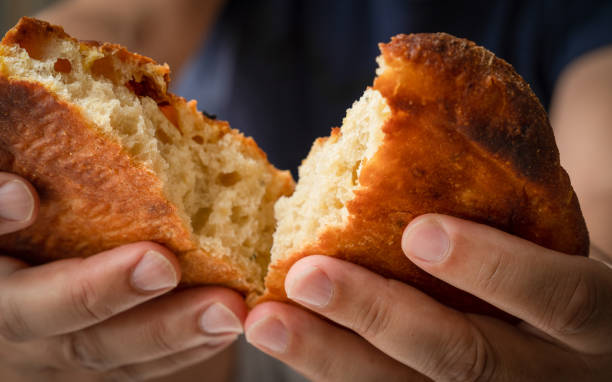EVENING MASS OF THE LORD’S SUPPER
First Reading: Ex 12:1-8. 11-14; Psalm: 116. R. v. 1Cor 10:16; Second Reading: 1Cor 11:23-26; Gospel: Jn 13:1-15
BROKEN FOR US
BY FR VALENTINE NNAMDI EGBUONU, MSP

‘. . . and when he had given thanks, he broke it and gave it to his disciples saying, “This is my body which is for you.’” (1Cor 11:24)
Every evening of Holy Thursday, the Church celebrates the Mass of the Lord’s Supper; the last meal Jesus ate with his disciples before his passion. Jesus often ate meals with his disciples but this very meal was different because unlike other meals, this very one was eaten at an appointed time which portrays the significance of this meal. It was during the Passover Feast which commemorates Israel’s Passover meal in Egypt and their freedom from that land of slavery that Jesus ate this meal with his disciples offering us his body and blood in the appearances of bread and wine. By this very action, Jesus replaced the Passover meal with the Eucharistic meal.
St Paul recounted that while Jesus was at table with his disciples on the night when he was betrayed, he took bread, and when he had given thanks, he broke it and gave it to his disciples saying, “This is my body which is for you.”
It is very essential that Jesus broke the bread, his own very body before giving it to his disciples to eat. Recall that Israel could not have eaten the Passover meal unless the Passover lamb was killed. The Eucharistic bread could not have been eaten unless it was broken and shared. And Jesus could not have offered us eternal life unless he was sacrificed on the cross. So it was a necessary action for Christ to break the bread before giving it to his disciples to eat. The breaking of this bread pointed to the sacrifice or the offering of himself on the cross to give us life. So if Christ had to die to give us life; then the Eucharistic bread had to be broken to re-enact the sacrifice of the cross and the life that it offers.
So whenever we gather at Mass to share in this Eucharistic meal, we must always remember the brokenness of the bread we share and eat. And this underscores the irony of the brokenness of the Eucharist. Because while the word “brokenness” literally means “a condition in which something is badly damaged and unable to continue to work correctly;” the brokenness of the Eucharistic bread on the other hand perfects our soul which becomes new and incorruptible through the worthy reception of the Body of Christ broken for us.
At this Mass, when we eat this bread broken to perfect our soul, we become bread broken for the lives of others. This means that whenever we receive the body of Christ, we are called to become what we have received. So our lives would require that we must necessarily make sacrifices to inspire and save the souls of others.
So we must always remember that whenever we depart at the end of every Mass, we depart with our brokenness. Our brokenness is to seek to serve and not to be served just as Jesus did when he washed the feet of his disciples. Our brokenness is to face ridicule and pain for choosing to stand for what is right. It is to bear hurts and choose to forgive as Jesus did on the cross even when our offenders show no remorse. It is to deny ourselves certain benefits to give to others what they do not have. And ultimately, it is to choose to die rather than corrupt our souls perfected by the brokenness of Christ’s body. Our brokenness is the true sign of our participation in this Eucharistic meal.
PRAYER FOR THE DAY
Lord Jesus, we thank you for the gift of your body and blood. Help us to become bread broken for the lives of the world. Amen.



Amen.